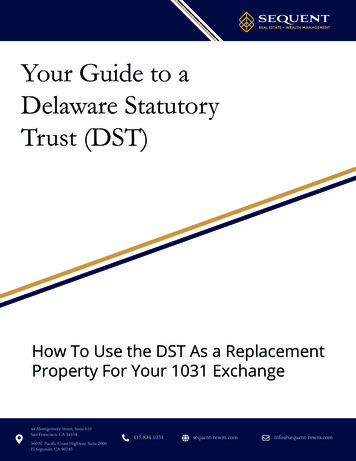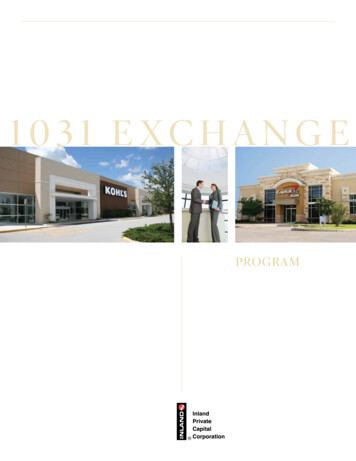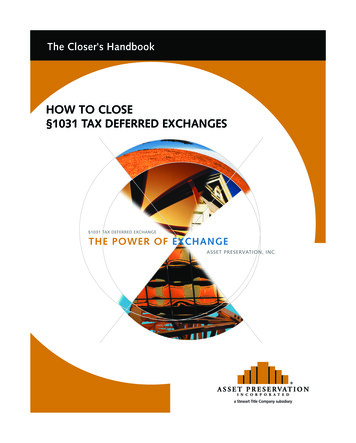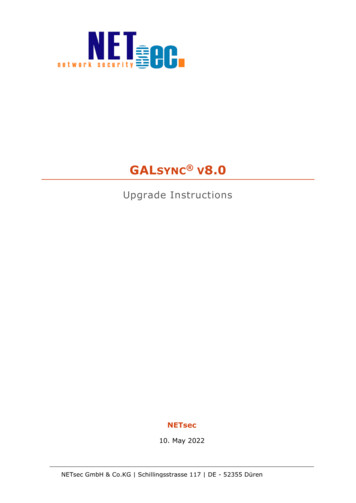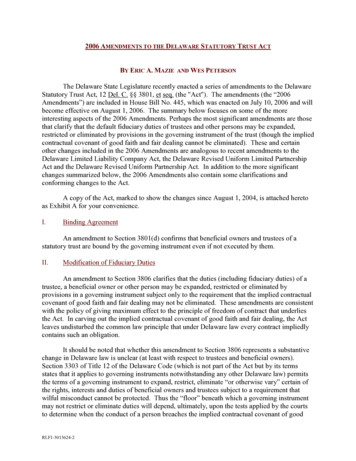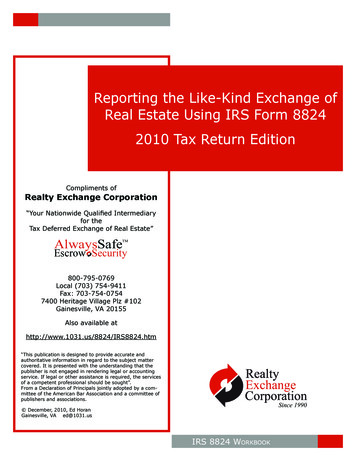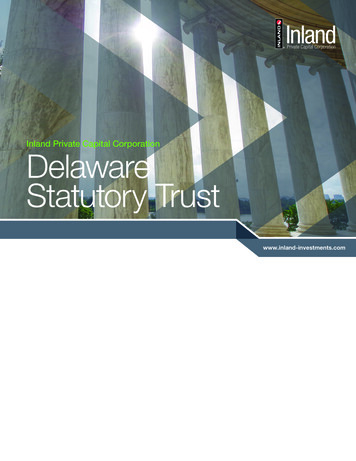
Transcription
Private Capital CorporationInland Private Capital CorporationDelawareStatutory Trustwww.inland-investments.com
What is a Delaware Statutory Trust ?A DST is a business trust created under Delaware law. A DST can be used in a wide variety of businesssettings. However, to use a DST in a Section 1031 syndication program, it must comply with therequirements of IRS Revenue Ruling 2004-86 and must also (if the DST’s property is debt financed) meetlender requirements. To satisfy these requirements, each of Inland Private Capital Corporation-sponsoredDSTs must: Be a special purpose entity (SPE). This means that the purposes of the DST must be limited to theacquisition, conservation, protection and disposition of its real estate assets. Be bankruptcy remote. This means that the DST must be operated both formally and functionally asan entity that is distinct from the sponsor, the investors and any other person. Be a passive holder of real estate. This means that (a) the trustee of the DST can have only limitedpower over the operation of the DST’s real estate, and (b) the investors in the DST can have nopowers whatsoever over the operation of the DST’s real estate.
Lender BenefitsManagement and control advantages. In tenant-in Common (TIC) deals, the IRS requires thatcertain fundamental decisions, such as a sale or refinancing of the property, or entering into leases,management or brokerage agreements, be made unanimously by investors.In contrast, a Delaware Statutory Trust (DST) structure takes all decision-making out of the hands ofinvestors and places it into the hands of a sponsor-affiliated trustee. Accordingly, in times of crisis, DSTsare more agile decision-makers than TIC programs.Structural simplicity. In a TIC deal, each investor owns a fractional interest in the underlying realestate through a special purpose entity, usually a limited liability company (LLC). In addition, investors arerequired to join a Co-Ownership Agreement (governing relations with other investors), a managementagreement or master lease (governing relations with the investment program sponsor), and becomeborrowers under the loan agreement.In a DST offering, however, investors need to execute only one agreement -- the trust agreement for theDST. The DST will own 100% of the fee interest in its real estate, so unlike a TIC program, the lender onlyneeds to make one loan to one borrower. In addition, due to the limited authority investors are permittedto have over a DST, lenders do not require investors to execute any nonrecourse carve-out guarantees,or to perform due diligence on any of the investors, beyond any standard anti-terrorism requirements andother similar “know your customer” due diligence.
Investor BenefitsCosts to investors of participation in a DST program are much lower than the costs of a TIC program.In a DST program, investors do not need to incur the annual costs of maintenance and qualification ofa special purpose LLC to hold their real estate interest. In addition, DST investors are not required toexecute lender guarantees or indemnities, given their purely passive relationship to the DST and the realestate. Furthermore, because all management authority in a DST is vested in the sponsor-affiliated trustee,there is no risk of investors being held hostage in a time of crisis by a “rogue investor,” as has occurredtoo often in TIC workout situations.Investors are also benefitted by the enhanced scalability and diversification DST programs can achieve.Because the IRS limits the number of investors in any single TIC program to 35, they are generally limitedto mid-size or smaller properties (less than 25 million total value) and require large minimum investments(often at least 500,000). DSTs, however, are not subject to an investor limit under the tax law, andcan have up to 2,000 investors. Thus, DSTs can own properties with aggregate value much greaterthan any TIC deal, while simultaneously accommodating much smaller minimum investments, allowingdiversification of investments across multiple DST programs.DST Limitations - Seven Deadly SinsIn certain respects, DST programs are more restrictive than TIC programs. In order for an interest in a DSTto be treated as a direct interest in real estate for Section 1031 purposes, the IRS has held that it must notbe able to violate the “seven deadly sins.” They are:1. Once the offering is closed, there can be no future capital contributions to the DST by either current ornew beneficiaries.2. The trustee cannot renegotiate the terms of the existing mortgage loans nor can it obtain any newmortgage financing from any party except where a property tenant is bankrupt or insolvent.3. The trustee cannot enter into new leases or renegotiate existing leases except where a property tenantis bankrupt or insolvent.4. The trustee cannot reinvest the proceeds from the sale of its real estate.5. The trustee is limited to making the following types of capital expenditures with respect to the property:(a) expenditures for normal repair and maintenance of the property,(b) expenditures for minor non-structural capital improvements of the property, and(c) expenditures for repairs or improvements required by law.6. Any cash held between distribution dates can only be invested in short-term debt obligations.7. All cash, other than necessary reserves, must be distributed on a current basis.Given the restrictions on their activities, DSTs are not designed for all property classes. They are bestsuited for properties subject to a long-term lease to a creditworthy tenant on a triple-net basis, and canalso successfully be used with a “master lease” structure for multi-family, multi-tenant retail, andsimilar property types.
The Springing LLC asThe “Emergency Parachute”The typical trust agreement for an Inland Private Capital Corporation-sponsored DST provides that if the trusteedetermines that the DST is in danger of losing the property due to its inability to act because of the “sevendeadly sins,” and in certain other situations as may be required by the lender, it can convert the DST into alimited liability company (the Springing LLC), the operating terms for which are predetermined in the DST’s trustagreement. In a conversion under Delaware law, the Springing LLC is treated as the same entity as the DST. Thismeans that, for purposes of Delaware state law, there is no real estate transfer or change in the borrower. Theoperating agreement for the Springing LLC will contain the same SPE and bankruptcy remoteness provisionsthat are contained in the DST’s trust agreement. However, it will not contain the prohibitions against the “sevendeadly sins” and thus will permit the raising of additional capital contributions, the raising of new financing, therenegotiation of the terms of the existing financing, or entering into new or modified leases. In addition, it willprovide that the trustee (or sponsor) will become the manager of the Springing LLC.Although the conversion of a DST into a Springing LLC permits actions to be taken to conserve and protect aninvestor’s investment, the Springing LLC will be treated as a partnership for federal income tax purposes. Amongother things, this means that investors will not be able to engage in a Section 1031 exchange of their interests inthe Springing LLC. While strategies exist that may be available in certain circumstances to put investors back intoan ownership structure that can be exchanged for Section 1031 purposes, no guarantees as to outcomes can begiven. Nevertheless, the benefits of the Springing LLC when the need for it arises vastly outweigh the uncertaintythat exists with respect to tax aspects of an exit from a Springing LLC.
Important Risk Factors to Consider No public market currently exists, and one may never exist, for the interestsof any IPCC-sponsored program. The purchase of interests in any IPCCsponsored program is suitable only for persons who have no need for liquidityin their investment and who can afford to lose their entire investment.IPCC-sponsored programs offer and sell interests pursuant to exemptionsfrom the registration provisions of federal and state law and, accordingly, thoseinterests are subject to restrictions on transfer. There is no guarantee that the investment objectives of any particular IPCCsponsored program will be achieved.The actual amount and timing of distributions paid by IPCC-sponsoredprograms is not guaranteed and may vary. There is no guarantee that investorswill receive distributions or a return of their capital.Investments in real estate are subject to varying degrees of risk, including,among other things, local conditions such as an oversupply of space orreduced demand for properties, an inability to collect rent, vacancies,inflation and other increases in operating costs, adverse changes in lawsand regulations applicable to owners of real estate and changing marketdemographics. IPCC-sponsored programs depend on tenants for their revenue, and maysuffer adverse consequences as a result of any financial difficulties, bankruptcyor insolvency of their tenants.IPCC-sponsored programs may own single-tenant properties, which may bedifficult to re-lease upon tenant defaults or early lease terminations.Continued disruptions in the financial markets and challenging economicconditions could adversely affect the ability of an IPCC-sponsored programto secure debt financing on attractive terms and its ability to service thatindebtedness.The prior performance of other programs sponsored by IPCC should not beused to predict the results of future programs.The acquisition of interests in an IPCC-sponsored program may not qualifyunder Section 1031 of the Internal Revenue Code of 1986, as amended (the“Code”) for tax-deferred exchange treatment.Certain of the programs previously sponsored by IPCC have experiencedadverse development in the pasThe companies depicted herein may have proprietary interests in their trade names and trademarks. Nothing herein shall be considered to be an endorsement, authorizationor approval of Inland Private Capital Corporation, or the investment vehicles it may offer, by the aforementioned companies. Further, none of the aforementioned companiesare affiliated with Inland Private Capital Corporation in any manner. This material is neither an offer to sell, nor the solicitation of an offer to buy any security, which canbe made only by a Private Placement Memorandum (the “Memorandum”), and sold only by broker/dealers authorized to do so. Investments are suitable for accreditedinvestors only.The Inland name and logo are registered trademarks being used under license.Prepared by:Seyfarth Shaw LLP131 S. Dearborn StreetSuite 2400Chicago, IL 60603www.seyfarth.comInland Private Capital Corporation888.671.1031This publication is not intended to provide legal advice but to provide information on legal matters of interest to our colleagues. Readers should seek specific legal advicebefore taking any action with respect to matters mentioned in this publication. Under professional rules, this publication may be considered advertising material; the attorneyresponsible for this publication is Steven R. Meier.Private Capital Corporation2901 Butterfield RoadOak Brook, IL 60523888.671.1031www.inland-investments.comDate first published: 03/2005Current publication date: 12/20142
What is a Delaware Statutory Trust ? A DST is a business trust created under Delaware law. A DST can be used in a wide variety of business settings. However, to use a DST in a Section 1031 syndication program, it must comply with the requirements of IRS Revenue Ruling 2004-86 and must also (if the DST's property is debt financed) meet



